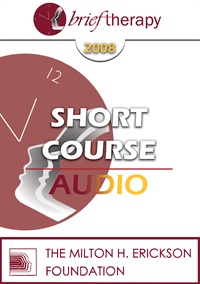
- Average Rating:
- Not yet rated
- Topic Areas:
- Short Courses | Interviewing | Solution Oriented Approach | Brief Therapy | Motivation
- Categories:
- Brief Therapy Conference | Brief Therapy Conference 2008
- Faculty:
- Lindasue Marshall, LCSW | Ernest Marshall, MSW
- Duration:
- 1:29:49
- Format:
- Audio Only
- Original Program Date:
- Dec 11, 2008
- Short Description:
- Interventions often fail because the client is not yet truly motivated for change. Motivational interviewing elicits intrinsic motivation and is highly effective in conjunction with Solution Focused Brief Therapy (SFBT). Participants will recognize language demonstrating readiness for change and learn how to integrate SFBT interventions to bring about lasting change.
- Price:
- $15.00 - Base Price
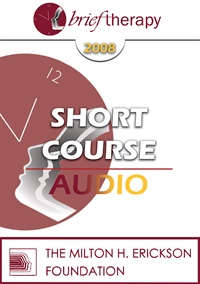
- Average Rating:
- Not yet rated
- Topic Areas:
- Short Courses | Aging and Mortality | Brief Therapy | Grief | Relationships
- Categories:
- Brief Therapy Conference | Brief Therapy Conference 2008
- Faculty:
- Kevin Humphrey, MA | Allan Sargent | Marilyn Sargent
- Duration:
- 1:19:57
- Format:
- Audio Only
- Original Program Date:
- Dec 11, 2008
- Short Description:
- Often, "oh, no!" is the first response to loss, be it a wallet, loved one, or dream. Something is gone. What happens next? One could get mired in cultural expectations that there must be denial, anger, depression - or, one can flow through the natural grief sequence to understanding, having appropriate emotions and being proactive. Learn how to get back into balance processing grief with nature's intention - having loving and healthy connections.
- Price:
- $15.00 - Base Price
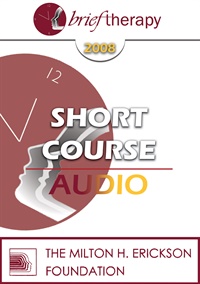
- Average Rating:
- Not yet rated
- Topic Areas:
- Short Courses | Brief Therapy | Neuroscience | Psychotherapy
- Categories:
- Brief Therapy Conference | Brief Therapy Conference 2008
- Faculty:
- Richard Hill, MBMSc, MEd, MA
- Duration:
- 1:33:24
- Format:
- Audio Only
- Original Program Date:
- Dec 11, 2008
- Short Description:
- Recent knowledge breakthroughs in neuroscience and neurophysiology explain why stress and anxiety are increasing despite enormous developments in psychotherapy. The work of Daniel Siegel, Ernest Rossi, Stephen Porges, Aronson & Steele and Jonathan Haidt act as pieces of a puzzle that explain why therapy can fail; and how this "winner/loser world" mindset is an unseen barrier to our more natural creative, interpersonal processes. A new world view is presented that can act as a lasting, transformational brief therapy.
- Price:
- $15.00 - Base Price
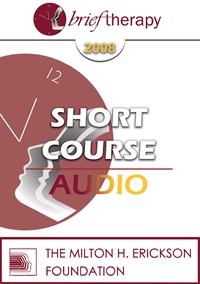
- Average Rating:
- Not yet rated
- Topic Areas:
- Short Courses | Attachment | Experiential Therapy | Psychotherapy | Brief Therapy
- Categories:
- Brief Therapy Conference | Brief Therapy Conference 2008
- Faculty:
- Hanna Levenson, PhD
- Duration:
- 1:01:35
- Format:
- Audio Only
- Original Program Date:
- Dec 11, 2008
- Short Description:
- A model of brief therapy incorporating current developments in psychodynamic, interpersonal, attachment, experiential, and systems approaches will be presented. This approach is designed to be of help with the so-called difficult client who has chronically dysfunctional ways of relating to others. Videotaped segments of actual sessions will illustrate formulation and intervention strategies.
- Price:
- $15.00 - Base Price
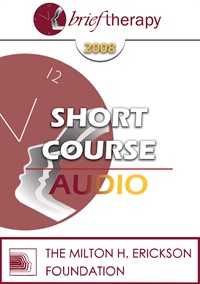
- Average Rating:
- Not yet rated
- Topic Areas:
- Short Courses | Memory | Psychotherapy | Utilization | Brief Therapy
- Categories:
- Brief Therapy Conference | Brief Therapy Conference 2008
- Faculty:
- Joseph Meyerson, MA
- Duration:
- 47:01
- Format:
- Audio Only
- Original Program Date:
- Dec 11, 2008
- Short Description:
- The possibility of utilizing memory plasticity for therapeutic purposes has not been widely recognized, although a number of theoretical and clinical venues during the past century have shown its potential application. This short course is aimed at shedding light on this broad field of hypnotherapeutic interventions and to present a primary map for the clinician interested in the psychotherapeutic implementation of MFI.
- Price:
- $15.00 - Base Price

- Average Rating:
- Not yet rated
- Topic Areas:
- Short Courses | Brief Therapy | Children and Adolescent Therapy | Anxiety | Ericksonian Hypnosis and Therapy Techniques
- Categories:
- Brief Therapy Conference | Brief Therapy Conference 2008
- Faculty:
- Lynn Lyons, LICSW
- Duration:
- 1:16:09
- Format:
- Audio Only
- Original Program Date:
- Dec 11, 2008
- Short Description:
- Excessive anxiety in childhood is a significant predictor of eventual comorbid depression and other conditions. This presentation will identify the cognitive processes and coping strategies that help create a cycle of anxiety, psychosocial isolation, and depression in anxious children and families. Attention will be given to the development of specific, empirically supported Ericksonian strategies which can help shift the anxious individual and family toward malleability, creativity and adaptability.
- Price:
- $15.00 - Base Price
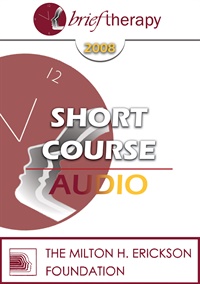
- Average Rating:
- Not yet rated
- Topic Areas:
- Short Courses | Pain and Healing | Brief Therapy | Trauma
- Categories:
- Brief Therapy Conference | Brief Therapy Conference 2008
- Faculty:
- Maggie Phillips, PhD
- Duration:
- 1:25:08
- Format:
- Audio Only
- Original Program Date:
- Dec 11, 2008
- Short Description:
- This short course presents brief interventions designed to address and remove common barriers to successful treatment of pain conditions. Topics include: ways to reverse and regulate the emotional and physical impact of traumatic experiences; the necessity of medicine for the mind as well as the body; how to utilize the polyvagal nervous system in planning treatment strategy; how to help pain patients create healing connections with self, other and the divine; and how to teach people in pain to build on success. This session will include live demonstration and experiential practicum. Case consultation is welcome.
- Price:
- $15.00 - Base Price
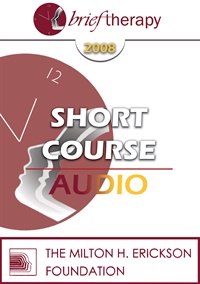
- Average Rating:
- Not yet rated
- Topic Areas:
- Short Courses | Brief Therapy | Meditation, Spirituality and Yoga | Research
- Categories:
- Brief Therapy Conference | Brief Therapy Conference 2008
- Faculty:
- Alexander Simpkins, PhD | Annellen M. Simpkins, PhD
- Duration:
- 1:25:19
- Format:
- Audio Only
- Original Program Date:
- Dec 11, 2008
- Short Description:
- Meditation offers useful and varied methods for brief therapy. Important scientific studies on meditation's neuroscience and clinical applications show many meditation methods are effective. Yoga, Buddhism, Daoism and Zen are described, each with its key concepts and unique approaches to mental development. Attendees learn research, theory and useful meditation methods step-by-step, including concentration, breathing, mindfulness, wu-wei, qi gong and zazen. Case examples form links to practice. Therapists will fine lasting solutions to enhance therapeutic work.
- Price:
- $15.00 - Base Price
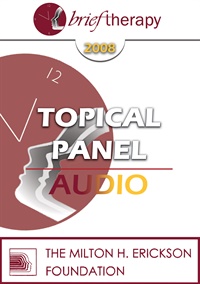
- Average Rating:
- Not yet rated
- Topic Areas:
- Topical Panels | Brief Therapy | Goals of the Therapist
- Categories:
- Brief Therapy Conference | Brief Therapy Conference 2008
- Faculty:
- Scott Miller, PhD | Erving Polster, PhD | John C. Norcross, PhD | James Prochaska, PhD
- Duration:
- 1:00:37
- Format:
- Audio Only
- Original Program Date:
- Dec 13, 2008
- Short Description:
- BT08 Topical Panel 01 - Setting Goals in Brief Therapy - Scott Miller, PhD, John Norcross, PhD, Erving Polster, PhD, James Prochaska, PhD
- Price:
- $15.00 - Base Price
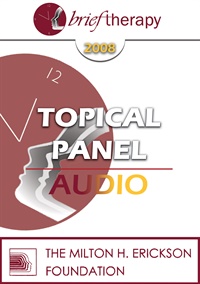
- Average Rating:
- Not yet rated
- Topic Areas:
- Topical Panels | Mind-Body | Brief Therapy
- Categories:
- Brief Therapy Conference | Brief Therapy Conference 2008
- Faculty:
- Jon Carlson | Robert Dilts, BA | Stephen Gilligan, PhD | Peter Levine, PhD
- Duration:
- 59:07
- Format:
- Audio Only
- Original Program Date:
- Dec 13, 2008
- Short Description:
- BT08 Topical Panel 02 - Mind-Body Issues - Jon Carlson, EdD, PsyD, Robert Dilts, Stephen Gilligan, PhD, Peter Levine, PhD
- Price:
- $15.00 - Base Price
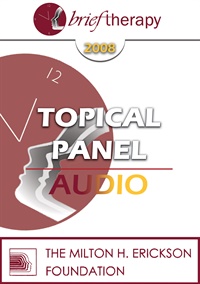
- Average Rating:
- Not yet rated
- Topic Areas:
- Topical Panels | Brief Therapy | Couples Therapy | Family Therapy
- Categories:
- Brief Therapy Conference | Brief Therapy Conference 2008
- Faculty:
- Jon Carlson | Stephen Karpman, MD | Florence Kaslow, PhD, ABPP | Matthew Selekman, MSW
- Duration:
- 1:05:14
- Format:
- Audio Only
- Original Program Date:
- Dec 13, 2008
- Short Description:
- BT08 Topical Panel 05 - Brief Therapy with Couples and Families - Jon Carlson, PsyD, EdD, Stephen Karpman, MD, Florence Kaslow, PhD, ABPP, Matthew Selekman, MSW
- Price:
- $15.00 - Base Price
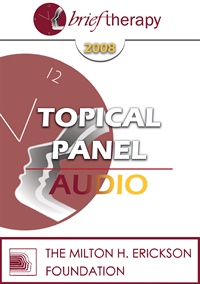
- Average Rating:
- Not yet rated
- Topic Areas:
- Topical Panels | Brief Therapy | Milton Erickson
- Categories:
- Brief Therapy Conference | Brief Therapy Conference 2008
- Faculty:
- Stephen Gilligan, PhD | Stephen Lankton, MSW | Ernest Rossi, PhD | Jeffrey Zeig, PhD
- Duration:
- 59:58
- Format:
- Audio Only
- Original Program Date:
- Dec 13, 2008
- Short Description:
- BT08 Topical Panel 06 - About Milton Erickson - Stephen Gilligan, PhD, Stephen Lankton, MSW, DAHB, Ernest Rossi, PhD, Jeffrey Zeig, PhD
- Price:
- $15.00 - Base Price
Tags: Brief Therapy Milton Erickson
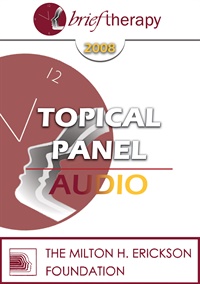
- Average Rating:
- Not yet rated
- Topic Areas:
- Topical Panels | Multicultural | Brief Therapy
- Categories:
- Brief Therapy Conference | Brief Therapy Conference 2008
- Faculty:
- Steven Hayes, PhD | Jeffrey Kottler, PhD | Mary Goulding, MSW | Claudio Naranjo, MD
- Duration:
- 59:40
- Format:
- Audio Only
- Original Program Date:
- Dec 13, 2008
- Short Description:
- BT08 Topical Panel 10 - Cross-Cultural Issues - Steven Hayes, PhD, Jeffrey Kottler, PhD, Mary Goulding, MSW, Claudio Naranjo, MD
- Price:
- $15.00 - Base Price
Tags: Brief Therapy Multi-Cultural
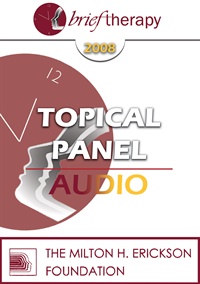
- Average Rating:
- Not yet rated
- Topic Areas:
- Topical Panels | Art and Creativity | Psychotherapy | Brief Therapy
- Categories:
- Brief Therapy Conference | Brief Therapy Conference 2008
- Faculty:
- Steve Andreas, MA, NLP | Scott Miller, PhD | Erving Polster, PhD | Ernest Rossi, PhD
- Duration:
- 58:47
- Format:
- Audio Only
- Original Program Date:
- Dec 13, 2008
- Short Description:
- This topical panel takes on the long-standing question of whether psychotherapy is an art, a science, or something in between. Through personal reflection, theory, and clinical experience, the conversation explores creativity, evidence, embodiment, and relationship, offering a grounded look at how therapists actually learn, decide, and change alongside their clients.
- Price:
- $15.00 - Base Price
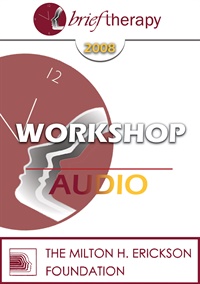
- Average Rating:
- Not yet rated
- Topic Areas:
- Workshops | Trauma | Brief Therapy | Children and Adolescent Therapy
- Categories:
- Brief Therapy Conference | Brief Therapy Conference 2008
- Faculty:
- Lenore Terr, MD
- Duration:
- 2:45:21
- Format:
- Audio Only
- Original Program Date:
- Dec 11, 2008
- Short Description:
- Whether brief or long-term, the treatment of childhood trauma should include an opportunity for the youngster to abreact (express strong emotion), correct (find individual, community or even fantasized solutions), and to discover contexts (perspectives and understandings of the events that occurred). Dr. Terr will thoroughly discuss and exemplify these three modes of treatment, selecting brief therapies as the clinical examples.
- Price:
- $15.00 - Base Price
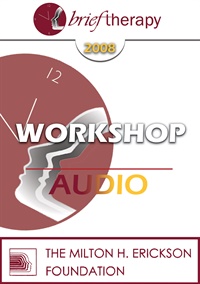
- Average Rating:
- Not yet rated
- Topic Areas:
- Workshops | Adlerian Therapy | Brief Therapy | Psychotherapy
- Categories:
- Brief Therapy Conference | Brief Therapy Conference 2008
- Faculty:
- Jon Carlson
- Duration:
- 44:18
- Format:
- Audio Only
- Original Program Date:
- Dec 11, 2008
- Short Description:
- Adlerian psychotherapy is an effective brief therapy model that integrates strategies from many other approaches. Adler's ideas highlight the importance of not only understanding the individual but the social context. This approach emphasizes working from a multi-cultural orientation and highlights personal responsibility. The approach uses a four-step process: Engagement, Assessment, Insight, and Reorientation. The focus of treatment is positive as the therapist uses encouragement strategies to help the client identify their assets and strengths. Videotape examples of actual sessions will be used to highlight the process and demonstrate how effective short-term change is possible with this approach.
- Price:
- $15.00 - Base Price
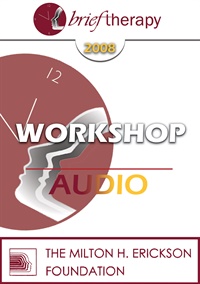
- Average Rating:
- Not yet rated
- Topic Areas:
- Workshops | Borderline | Brief Therapy | Personality Disorders | Solution Oriented Approach
- Categories:
- Brief Therapy Conference | Brief Therapy Conference 2008
- Faculty:
- Michael Munion, MA, LPC
- Duration:
- 2:28:27
- Format:
- Audio Only
- Original Program Date:
- Dec 11, 2008
- Short Description:
- This workshop examines the nature of Borderline Personality Disorder (BPD), and presents an integrated model of treatment of specific issues in brief, solution-focused episodes. Core elements of a safety plan and development of a community resource network are described. Careful management of the therapeutic relationship is a critical part of this approach. Some specific protocols for common BPD issues, such as suicidal ideation and self-injurious behaviors are elaborated.
- Price:
- $15.00 - Base Price
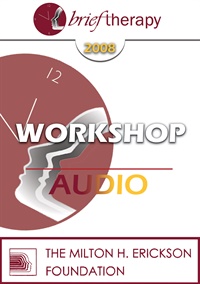
- Average Rating:
- Not yet rated
- Topic Areas:
- Workshops | Children and Adolescent Therapy | Brief Therapy | Meditation, Spirituality and Yoga | Mindfulness | Strengths-Based
- Categories:
- Brief Therapy Conference | Brief Therapy Conference 2008
- Faculty:
- Matthew Selekman, MSW
- Duration:
- 2:34:38
- Format:
- Audio Only
- Original Program Date:
- Dec 11, 2008
- Short Description:
- Adolescent self-harming behavior is on the rise and is one of the most challenging presenting problems school professionals, healthcare providers, and therapists will face in their clinical practice settings. In this "hands-on" practice-oriented workshop, participants will learn several distress management tools and strategies to strengthen the adolescent's self-soothing and coping capacities and family connection building rituals and therapeutic experiments to foster closer and stronger parent-adolescent relationships. Parent management skills for constructively responding to their adolescents' inevitable self-harming slips will be presented.
- Price:
- $15.00 - Base Price
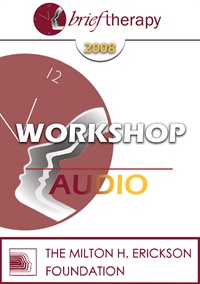
- Average Rating:
- Not yet rated
- Topic Areas:
- Workshops | Utilization | Brief Therapy | Self-Image Thinking | Resources
- Categories:
- Brief Therapy Conference | Brief Therapy Conference 2008
- Faculty:
- Stephen Lankton, MSW
- Duration:
- 2:19:24
- Format:
- Audio Only
- Original Program Date:
- Dec 11, 2008
- Short Description:
- Three specific techniques are universally valuable in brief therapy: utilization, experience resource retrieval, experiential-based imagery rehearsal. This workshop provides an exposure to these concepts and techniques with clear examples and demonstrations. Participants should find numerous ways to enhance their brief therapy practice in any setting and with all populations of clients.To list the essential aspects of the utilization approach for reducing resistance across multiple settings.
- Price:
- $15.00 - Base Price
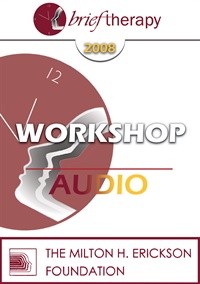
- Average Rating:
- Not yet rated
- Topic Areas:
- Workshops | Relationships | Brief Therapy | Therapist Development
- Categories:
- Brief Therapy Conference | Brief Therapy Conference 2008
- Faculty:
- Steve Andreas, MA, NLP
- Duration:
- 2:32:52
- Format:
- Audio Only
- Original Program Date:
- Dec 11, 2008
- Short Description:
- This workshop introduces a clear, experiential way to untangle difficult relationships by separating self, other, and observer positions. Through live demonstration and guided exploration, it shows how shifting physical orientation, language, and attention can dissolve emotional confusion, increase compassion, and restore clarity, helping clients decide how they want to relate, respond, or move forward.
- Price:
- $15.00 - Base Price
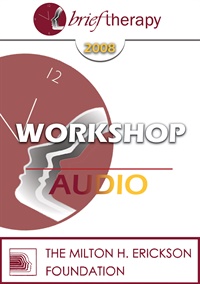
- Average Rating:
- Not yet rated
- Topic Areas:
- Workshops | Art and Creativity | Brief Therapy | Therapist Development
- Categories:
- Brief Therapy Conference | Brief Therapy Conference 2008
- Faculty:
- Jeffrey Kottler, PhD
- Duration:
- 2:02:24
- Format:
- Audio Only
- Original Program Date:
- Dec 11, 2008
- Short Description:
- The experience of being a therapist can often seem routine, dealing with similar issues, telling well-worn stories, and applying favored methods. Yet occasionally there are moments, even whole sessions, that appear miraculous in their innovation. This workshop explores the process and mechanisms of creative breakthroughs, based on interviews with the world's most innovative clinicians.
- Price:
- $15.00 - Base Price
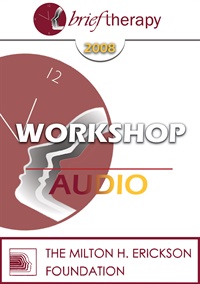
- Average Rating:
- Not yet rated
- Topic Areas:
- Workshops | Brief Therapy | Therapist Development
- Categories:
- Brief Therapy Conference | Brief Therapy Conference 2008
- Faculty:
- Erving Polster, PhD
- Duration:
- 2:46:16
- Format:
- Audio Only
- Original Program Date:
- Dec 11, 2008
- Short Description:
- Personal identity is a crucial guide to the way people live their lives. Dr. Polster will examine how therapy may accentuate and empower familiar identities and how to resuscitate those which are dimmed. Conceptual elaboration will be joined with live therapy sessions, showing how concepts connect with therapeutic work.
- Price:
- $15.00 - Base Price
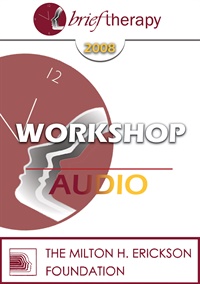
- Average Rating:
- Not yet rated
- Topic Areas:
- Workshops | Mindfulness | Acceptance and Commitment Therapy (ACT) | Brief Therapy | Therapist Development
- Categories:
- Brief Therapy Conference | Brief Therapy Conference 2008
- Faculty:
- Steven Hayes, PhD
- Duration:
- 2:40:20
- Format:
- Audio Only
- Original Program Date:
- Dec 11, 2008
- Short Description:
- Mindfulness and acceptance methods are powerful methods in clinical practice that greatly simplify the therapeutic tasks at hand. Acceptance and Commitment Therapy (ACT) will be described as an example of these methods and specific techniques will be shown. ACT targets common core processes that research are the basis for much psychopathology or restrictions on psychological health.
- Price:
- $15.00 - Base Price
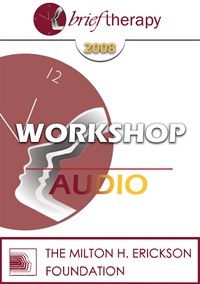
- Average Rating:
- Not yet rated
- Topic Areas:
- Workshops | Psychotherapy | Art and Creativity | Brief Therapy
- Categories:
- Brief Therapy Conference | Brief Therapy Conference 2008
- Faculty:
- Florence Kaslow, PhD, ABPP
- Duration:
- 2:47:20
- Format:
- Audio Only
- Original Program Date:
- Dec 12, 2008
- Short Description:
- Non-verbal techniques can constitute excellent companion methods to traditional testing and assessment tools, and clinical interviewing for evaluation and diagnosis of client/patient personalities, relationships and problems. In addition, they can provide additional avenues for intervening that can be utilized with many diverse populations of different ages and backgrounds, including those who may be hard to reach by verbal psychotherapeutic techniques. This workshop will demonstrate the use of these techniques and involve participants individually and interactively in their utilization so they will acquire skills to enrich their practices.
- Price:
- $15.00 - Base Price
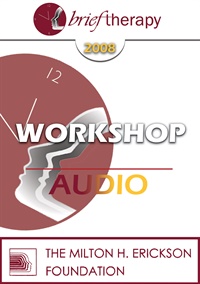
- Average Rating:
- Not yet rated
- Topic Areas:
- Workshops | Brief Therapy | Hypnosis | Neuroscience
- Categories:
- Brief Therapy Conference | Brief Therapy Conference 2008
- Faculty:
- Ernest Rossi, PhD
- Duration:
- 2:30:48
- Format:
- Audio Only
- Original Program Date:
- Dec 12, 2008
- Short Description:
- This workshop is an introductory presentation about how our daily mental activity turns on the activity-dependent gene expression and protein synthesis cycle to construct and reconstruct the neural networks of our brain. We will experience the four-stage creative process of art, science and psychotherapy during a group induction of therapeutic hypnosis.
- Price:
- $15.00 - Base Price

